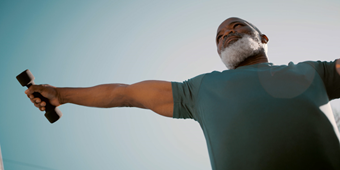Marathons May Damage Your Kidneys - Temporarily

Find Your Perfect Match
Answer a few questions and we'll provide you with a list of primary care providers that best fit your needs.
Rather than being cause for alarm, new research findings that marathon runners develop temporary kidney damage during a race may confirm your body’s resiliency.
To learn more, Premier Health Now talked with marathon runner Joshua Ordway, MD, Franklin Family Practice. He says that hydration and proper training can keep you healthy while running.
“A marathon, more than any other race, is one of trying to conserve hydration and calories, and that can be hard to do, especially if the running conditions are not ideal,” says Dr. Ordway.
The small study in the American Journal of Kidney Diseases points out the importance of knowing how long-distance running can impact the kidneys – especially for patients with kidney-related conditions.
When you run a marathon, you sweat and lose fluids. Running long distances causes muscle fatigue and injury, which releases toxins into the body. These events stress the kidneys.
As a twice-a-day runner, Dr. Ordway says he has experienced it himself. But the body is good at bouncing back. Once you finish running and rehydrate, the kidneys get back to normal and flush away the toxins.
The new study confirms that. Researchers tested blood and urine samples from 22 runners before a marathon, immediately after, and a day and a half later. They found:
- Higher-than-normal levels of creatinine in most runners right after the race.
- 82% of runners showed signs of at least stage one acute kidney injury.
- Signs of kidney injury disappeared two days later.
You can keep your kidneys healthy while marathoning, even with existing conditions.
“The best thing you can do is to stay hydrated,” says Dr. Ordway.
He also provides these tips:
- Talk with your doctor about your risks for kidney conditions or kidney damage.
- Train properly and gradually.
- The more fit you are, the better your muscles can withstand the trauma of long-distance running.
- Get used to swallowing liquids while running. Do it in training.
- Only drink water for training runs unless you're sweating heavily. There is no need for high-sugar or high-calorie drinks.
- Grab water at every drink station during a race, even if you don’t feel thirsty.
“I would not let a fear of kidney damage or strain on the kidneys dissuade anyone from training for a marathon,” says Dr. Ordway. “The training is so good for you and there are so many other benefits.”
Find Your Perfect Match
Answer a few questions and we'll provide you with a list of primary care providers that best fit your needs.
Source: Joshua Ordway, MD, Franklin Family Practice, CNN, American Journal of Kidney Diseases





